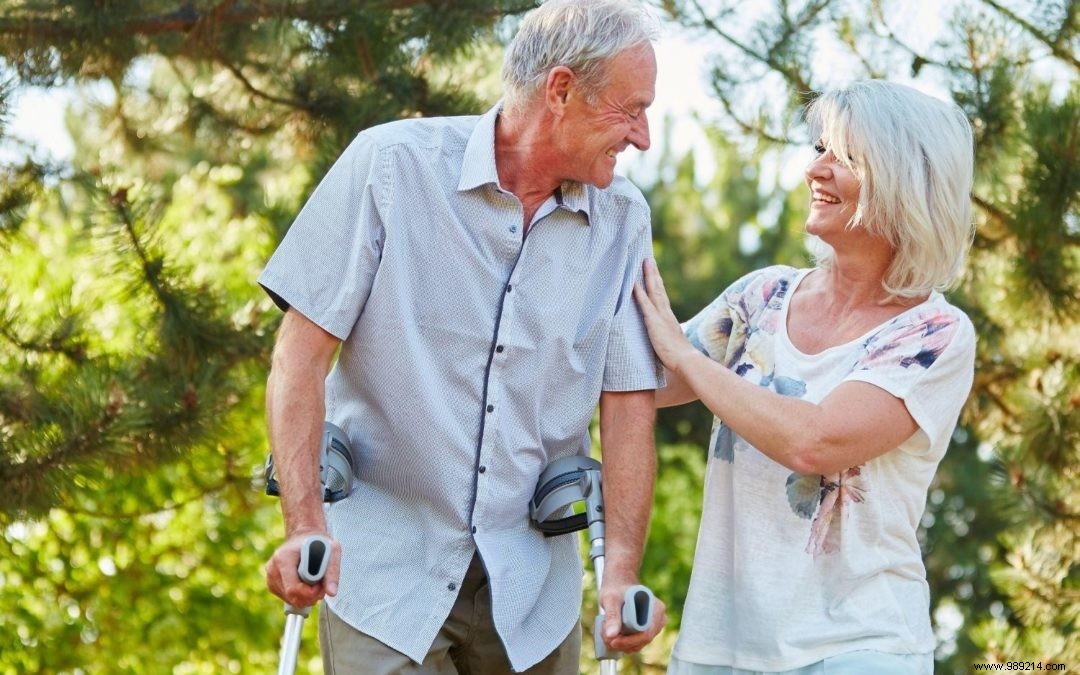
While falls can happen at any age, they are particularly serious for the elderly. This scourge is the leading cause of death among seniors. One in three people over 65 falls at least once a year and nearly 10,000 seniors die of a fall at home every year. After the health crisis, isolation and confinement give way to a renewed interest in outdoor activities put on hold, increasing the risk of falling for the elderly.
Follow our advice on support and prevention of falls for the elderly at home or outside.
The national institute for health and medical research, Inserm, has drawn up an alarming assessment about falls in the elderly. It shows that deaths following falls by an elderly person represent nearly 50% of deaths related to accidents in everyday life. In 40% of cases, the fall will require hospitalization .
Not every fall is synonymous with a serious accident. There are different types of falls that will cause a greater or lesser degree of severity. If you find yourself witnessing a fall, you should quickly analyze the severity of the latter:
Loss of consciousness is often a sign of greater seriousness than if the person is able to express themselves and understand their interlocutor. If you witness this type of accident, the first thing to do, after calling the emergency services, is to speak to the elderly person to reassure them and keep them awake.
Several risk factors can explain the falls of an elderly person. They can be linked to the environment, a home or a place not suitable for seniors, to a health problem leading to motor disorders and loss of balance (Parkinson's or Alzheimer's disease for example) or to a eating problem (malnutrition or undernutrition). But very often, old age and its associated disorders are the main causes of falls in the elderly:
The fall of an elderly person can have serious consequences, both physical and psychological. Here are some of the consequences of a fall on the physical and mental health of older people:
To avoid the dramatic consequences and the often very frequent recurrences of falls, it is necessary to multiply preventive measures to the senior public.
It has been proven that acts of prevention reduce the risk of falls by 24% . The measures that can be put in place to prevent accidental falls are of different kinds.
The most widespread and effective measure in the reduction and prevention of falls consists of adapting the home or the place of leisure of the elderly person . To do this, it is necessary to limit the obstacles such as slippery floors, carpets or cables for example. If the fall took place in the bathroom, an arrangement such as a bar or a shower seat is recommended. Certain behaviors are dangerous for the elderly person and can generate risk factors for accidental falls:cleaning their windows, changing a light bulb or carrying heavy loads. In this case,call on home help is strongly recommended.
The interest of diligent medical monitoring lies in the preventive measures which may result from this:wearing eyeglasses in case of loss of visual acuity, hearing aids if a loss of hearing is detected, medical mobility assistance equipment in case of imbalance (chair, cane). Similarly, practice a regular sporting activity will have a double advantage:protecting the physical and mental health of the elderly person.
Finally, as a precautionary measure, consider the support network to assist and visit the elderly person:neighbours, family members, carers, etc. All these prevention measures will significantly reduce the risk of falling.
After one or more falls, understanding and detecting the causes can help the elderly person in their daily life.
After a visit to the hospital following a fall, various tests may be prescribed . They can take the form of analyzes or motor skills tests for example. In the case of a food imbalance observed, a renutrition program can be set up with a dietician.
Finally, to promote the expression of pre- or post-traumatic discomfort, dialogue with health professionals as psychologists can represent a good means of prevention against accidental falls. The main thing is to get up after falling:physiotherapy sessions for a new acquisition of walking mechanisms can complement this medical program.
Following a fall, do you wonder? Consider telecare or home assistance that we offer.
Benefit from remote assistance or a home visit from a health professional. Listening, support and monitoring are our commitments to you. Your recovery after your fall will be in good hands and you can rely on us with confidence!
In the event of an accidental fall, act immediately, even if no injury is to be deplored. Consult a doctor or call 15 to avoid serious consequences following this fall.
https://www.santepubliquefrance.fr/ Maladies-et-traumatismes/traumatismes/chute/documents/enquetes-etudes/chutes-des-personnes-agees-a-domicile.-caracteristiques-des-chuteurs-et-des-circonstances -of-the-fall.-hospitalization-component-of-the-chupadom-survey
https://www.inserm.fr/expertise-collective/activite-physique-et-prevention-chutes-chez-personnes-agees/
https://www.silvereco.fr/chute-de-la-personne-agee-causes-consequences-et-prevention/3187245
https://www.ameli.fr/gironde/assure/sante/bons-gestes/seniors/prevenir-chutes-personnes-agees